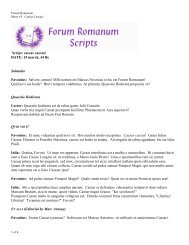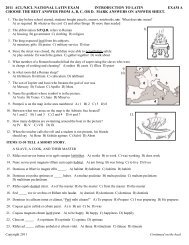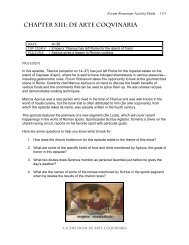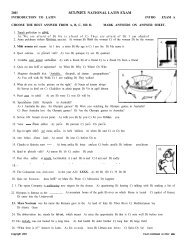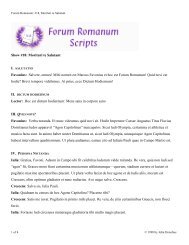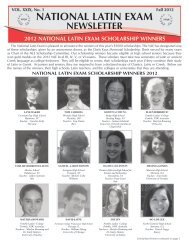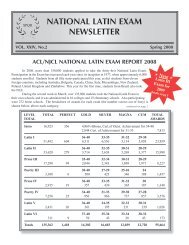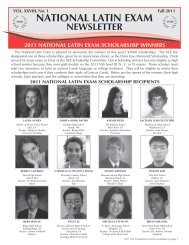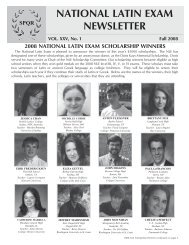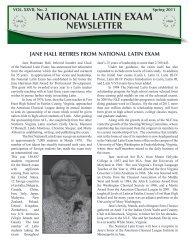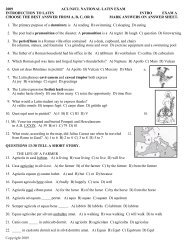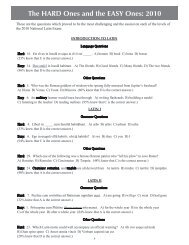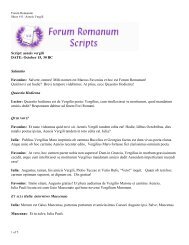Create successful ePaper yourself
Turn your PDF publications into a flip-book with our unique Google optimized e-Paper software.
A DISPATCH FROM ABROAD<br />
Caesar describes the harbor at Alexandria and his exploits t<strong>here</strong>.<br />
Pharus est in īnsulā turris magnā altitūdine, mīrificīs operibus exstrūcta; quae 1 Pharus = <strong>The</strong> Lighthouse (one of the<br />
nōmen ab īnsulā accēpit. Haec īnsula obiecta Alexandrīae portum efficit; sed, 2 Seven Wonders of the Ancient World)<br />
ā superiōribus rēgibus in longitūdinem passuum DCCC in mare iactīs mōlibus, 3 mōlibus = stone pilings<br />
angustō itinere, ut ponte, cum oppidō coniungitur. In hāc sunt īnsulā domicilia 4<br />
Aegyptiōrum et vīcus oppidī magnitūdine; quaeque ibi nāvēs imprūdentiā aut 5<br />
tempestāte paulum suō cursū dēcessērunt, hās mōre praedōnum dīripere 6 praedōnum = of robbers<br />
cōnsuērunt. Eīs autem invītīs ā quibus Pharus tenētur, nōn potest esse propter 7<br />
angustiās nāvibus introitus in portum. Hoc tum vēritus Caesar, hostibus in pugnā 8<br />
occupātīs, mīlitibus expositīs Pharum prehendit atque ibi praesidium posuit. 9 occupātīs = busy<br />
Quibus est rēbus effectum utī tūtō frūmentum auxiliaque nāvibus ad eum 10<br />
supportārī possent. 11<br />
Gaius Julius Caesar, Commentarii de Bello Civili, iii.112<br />
21. According to lines 1-2 (Pharus…accēpit), what is the source of the lighthouse’s name? A) its builder B) the island<br />
C) the ruler D) its height<br />
22. In line 2, obiecta is best translated A) beneath B) on the way C) far from D) opposite<br />
23. According to lines 3-4, what did the earlier kings do? A) repaired the original lighthouse<br />
B) built a fort next to the lighthouse C) joined the island to the town D) dredged the harbor<br />
24. In line 4, angustō itinere describes A) a staircase up the lighthouse B) the bridge-like path made of rocks<br />
C) the sea passage into the harbor D) a paved road around the island<br />
25. <strong>The</strong> best translation of ut in line 4 is A) as B) that C) in order to D) lest<br />
26. From lines 1-4, we can infer that Caesar is A) fearful B) impressed C) scornful D) questioning<br />
27. <strong>The</strong> phrase vīcus…magnitūdine (line 5) describes A) the location of the town B) the height of the lighthouse<br />
C) the size of the village D) the strength of the wall<br />
28. What human frailty drove the ships (line 5) from their course? A) foolishness B) wickedness C) laziness D) greed<br />
29. What word does paulum (line 6) modify? A) nāvēs B) tempestāte C) cursū D) dēcessērunt<br />
30. What were the Egyptians accustomed to do according to lines 6-7? A) light fires on the shore<br />
B) set ships in the harbor on fire C) attack the pirates D) plunder the passing ships<br />
31. <strong>The</strong> first principal part of cōnsuērunt (line 7) is A) cōnsuēscō B) cōnstō C) cōnstrīngō D) cōnsulō<br />
32. In line 7, the ablative absolute eīs invītīs refers to A) the island’s residents B) the Romans<br />
C) the island and the lighthouse D) the ships in the harbor<br />
33. From lines 7-8 (eīs...portum), we learn that access to the harbor is hindered by A) rocks B) darkness C) storms<br />
D) narrows<br />
34. <strong>The</strong> best translation of veritus (line 8) is A) in truth B) having feared C) ordering D) trusting<br />
35. From lines 8-9 (hoc…posuit), we learn that A) the enemy had the advantage<br />
B) infantry soldiers were placed on the ships C) the harbor was full of ships D) Roman troops held the island<br />
36. In line 10, frūmentum auxiliaque is best translated A) cargo and wagons B) transport ships and archers<br />
C) grain and reinforcements D) tents and infantry<br />
37. In line 11, possent is subjunctive in a A) conditional clause B) substantive result clause C) fearing clause<br />
D) relative clause of characteristic<br />
38. Lines 10-11 show Caesar’s concern for A) loyalty B) morale C) safety D) speed<br />
39. According to your knowledge of Roman history, what leader was killed shortly before Caesar’s arrival in Alexandria?<br />
A) Pompey B) Octavian C) Antony D) Crassus<br />
40. This passage occurs near the end of Commentarii de Bello Civili. What years would most closely approximate the time in<br />
which this passage was written? A) 65-60 BC B) 58-52 BC C) 49-46 BC D) 40-38 BC<br />
Copyright 2013



